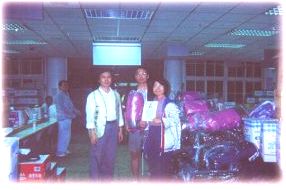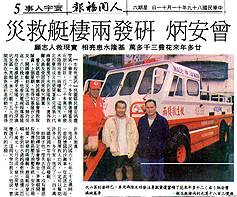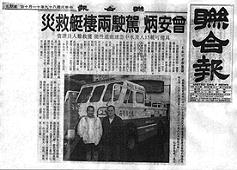|
Love
in Action
|
Report from Formosa
Typhoon
Xangsane
Disaster Relief
[Taipei] Typhoon Xangsane swept over Formosa on the first of November. Overnight torrential rains caused mudslides in the northern mountain areas, and the debris flow rushed down into the Keelung River. This, along with rising tides at the time, resulted in the severe flooding of several low-lying areas, including Keelung's Chitu and Wutu districts, Taipei's Neihu District, and Hsichih. Many buildings were submerged by water up to the second story.
When Master heard news of the disaster from abroad, She instructed initiates to immediately join in the relief work. The Taipei Center contacted the Financial Supervisor of the Hsichih City Office, Mr. Chen, and Miss Ji of the Chitu administrative office, and learned that roads had been blocked with silt, water and power supplies had been cut off, and cooking had been rendered impossible. The victims needed food provisions, potable water, and other supplies. The SMCH Association's Taipei Center wasted no time preparing these emergency provisions for the affected areas. Within two days, they delivered basic necessities valued at NT$257,615 (US$7,926) to the local administrative offices of Hsichih and Chitu, these including bread, instant noodles, cookies, mineral water, mixed grain porridge, and other relief materials. A Hsichih official accompanied fellow practitioners to the most heavily affected boroughs, where the relief materials were directly delivered to each borough chief for distribution.
Typhoon Xangsane also destroyed 90 percent of the crops ready for harvest on a farm in southern Formosa. The farmer, already plagued by financial troubles, received NT$50,000 (approx. US$1,538) in funding from The SMCH Association.
November 10, 2000 report
The heavy rain persisted for a week. On the evening of November 8, The Supreme Master Ching Hai International Association Relief Team received news that the water level of Keelung River was rising. Several team members immediately reported to the Chitu disaster relief command center with an amphibious vessel developed by brother initiate Tseng, two jeeps and a motorized rubber dinghy. When news came at five the next morning that some people trapped by a flash flood in Shenaokeng about 20 km away needed immediate evacuation, fellow practitioners rushed to the scene. The water was over three meters deep and cars were being carried away by the strong current. The rubber dinghies from the Fire Department were not power-driven and had to be secured to big trees to prevent them from being swept against the mountainside. Meanwhile, the trapped victims had already escaped by a mountain path. With the help of their amphibious vessel, fellow practitioners helped six firefighters (who expressed their gratitude afterward) tow their rubber dinghies to shallow waters. The excellent rescue capabilities of the amphibious jeep was appreciated by all of the witnesses. The rescue operation was reported by newspaper and television reporters, who traveled along on the amphibious vessels to examine the flood situation. The Chinese Television System, Formosa Television, United Daily News, and Merit Times carried the news. Satellite TV also carried live broadcasts of the situation even before relief equipment was stowed away.
Fellow practitioners took up their post in the more easily flooded areas of Hsichih and Wutu, maintaining vigilance until two in the afternoon. According to brother initiate Lin, head of the Keelung Red Cross Rescue Team who also participated in the rescue operation, the water level of Keelung River had risen near the critical mark several times, but each time, the water receded at the most dangerous point. Fellow practitioners were convinced that if it had not been for Master's grace, heavy losses of life and property might have occurred.
After the 921 earthquake in 1999, Master instructed us to organize relief teams to render more professional and efficient relief work. Fellow practitioners have earnestly devoted themselves to preparation work ranging from staff training, equipment and provisions purchase, to rescue work in affected areas. They have displayed the spirit of empathy and spread Master's love to every corner of society!
|
Love in Action |
|
| * | Malaysia |
| * | U.S.A. |
| * | El Salvador |
| * | Formosa |
| ~Hualien | |
| ~Taitung | |
| ~Taipei | |
| ~Hsihu (I) | |
| ~Hsihu (II) | |
|
News
No. 117 |
|


